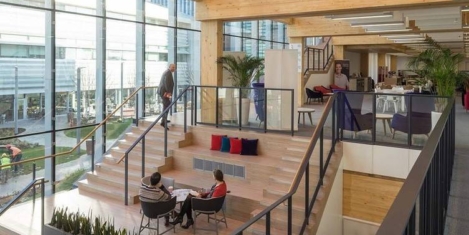To provide the best experiences, we use technologies like cookies to store and/or access device information. Consenting to these technologies will allow us to process data such as browsing behaviour or unique IDs on this site. Not consenting or withdrawing consent, may adversely affect certain features and functions.
The technical storage or access is strictly necessary for the legitimate purpose of enabling the use of a specific service explicitly requested by the subscriber or user, or for the sole purpose of carrying out the transmission of a communication over an electronic communications network.
The technical storage or access is necessary for the legitimate purpose of storing preferences that are not requested by the subscriber or user.
The technical storage or access that is used exclusively for statistical purposes.
The technical storage or access that is used exclusively for anonymous statistical purposes. Without a subpoena, voluntary compliance on the part of your Internet Service Provider, or additional records from a third party, information stored or retrieved for this purpose alone cannot usually be used to identify you.
The technical storage or access is required to create user profiles to send advertising, or to track the user on a website or across several websites for similar marketing purposes.
 A new survey claims that 67 percent of employees have missed major life events due to a lack of flexible working within their organisation. The survey conducted by Liberty Mind, was commissioned to explore the impacts on employees who do not have the opportunity of flexible working. From those surveyed it was found that 40 percent had missed hospital or health-related appointments due to a lack of flexible working, while 15 percent had missed moving house, 10 percent had missed a child’s school activity and 8 percent had missed a family funeral.
A new survey claims that 67 percent of employees have missed major life events due to a lack of flexible working within their organisation. The survey conducted by Liberty Mind, was commissioned to explore the impacts on employees who do not have the opportunity of flexible working. From those surveyed it was found that 40 percent had missed hospital or health-related appointments due to a lack of flexible working, while 15 percent had missed moving house, 10 percent had missed a child’s school activity and 8 percent had missed a family funeral.
















 A new report published by Information Services Group (
A new report published by Information Services Group (




 National Work Life Week (1st – 5th October 2018) starts today with the aim of encouraging companies to think about their employees’ wellbeing and happiness. To mark the week new research asked British workers about the things they most want from their work. The YouGov survey of 2,000 adults, commissioned by the Oxford Open Learning Trust, found that while money is predictably the biggest motivator behind career choice (64 percent), over half of the respondents cited working hours and flexible working as an important factor (55 percent).
National Work Life Week (1st – 5th October 2018) starts today with the aim of encouraging companies to think about their employees’ wellbeing and happiness. To mark the week new research asked British workers about the things they most want from their work. The YouGov survey of 2,000 adults, commissioned by the Oxford Open Learning Trust, found that while money is predictably the biggest motivator behind career choice (64 percent), over half of the respondents cited working hours and flexible working as an important factor (55 percent). 








October 5, 2018
Developing a resilient mindset to cope with stress
by Portia Hickey • Comment, Wellbeing
(more…)